
The Yindjibarndi Ngurra Aboriginal Corporation (YNAC) has filed a compensation claim against the state of Western Australia (WA), seeking A$1.8bn ($1.1bn) for damages to land and culture due to iron ore mining activities at the Solomon mining hub.
WA is a major global supplier of iron ore, accounting for around half of the world’s sea-borne supply.
The claim includes A$1bn for cultural damage and A$678m for economic loss, according to the Federal Court of Australia filings.
The case is significant as it could set a precedent for future claims related to past damages.
The YNAC is targeting the state government for authorising the mining activities, which may lead to the state seeking reimbursement from Fortescue, the world’s fourth-largest iron ore miner, reported Reuters.
Fortescue has acknowledged the Yindjibarndi People’s right to compensation but disagrees on the amount.
“Fortescue accepts that the Yindjibarndi People are entitled to compensation, however, the parties disagree on the amount of that compensation,” Fortescue mentioned in a statement to Reuters.
The state government, in its final submission, argued that the total compensation for economic loss should be A$128,114 and A$92,957 in interest.
It suggested that a fair award for cultural loss would be between A$5m and A$10m, which it believes reflects Australian community standards.
The WA government department responsible for Aboriginal heritage has refrained from commenting due to the ongoing legal proceedings. YNAC has also declined to comment further.
The Federal Court is currently hearing arguments, with a decision not expected until later in the year.
Filings indicate that the Solomon mine has caused existential damage to the Yindjibarndi people by destroying more than 285 archaeological sites and six Dreaming tracks, crucial to Australia’s understanding of human settlement dating back 40,000–45,000 years.
In 2017, the Yindjibarndi group won exclusive native title rights over the land encompassing the Solomon mining hub, which began operations in 2012 and has a capacity of up to 80 million tonnes of iron ore annually.
Native titles recognise indigenous rights to land in Australia.
This case follows the 2020 destruction of Juukan Gorge rock shelters by Rio Tinto, which caused international outrage and led to executive resignations.


